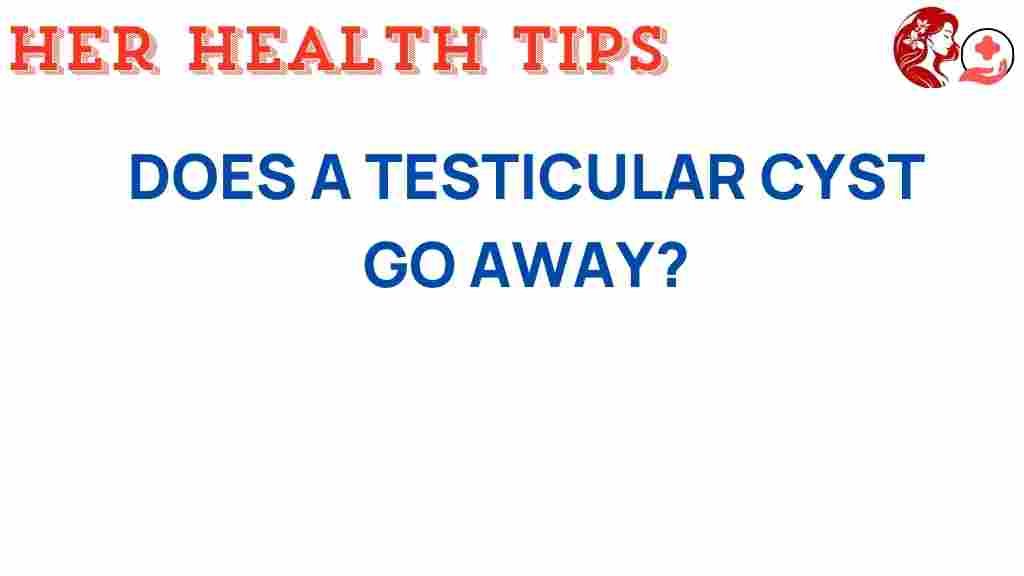Unraveling the Mystery: Do Testicular Cysts Really Disappear?
When it comes to men’s health, one topic that often raises questions is the presence of testicular cysts. These fluid-filled sacs can be a source of concern for many, leading to confusion and anxiety. In this article, we will explore the nature of testicular cysts, their symptoms, diagnosis, treatment options, and whether they can truly disappear. Understanding these aspects is crucial for managing health concerns effectively.
Understanding Testicular Cysts
A testicular cyst is a benign (non-cancerous) fluid-filled sac that forms in or on the testicles. They are often discovered during routine examinations or self-examinations and can vary in size from very small to several centimeters in diameter.
- Causes: Testicular cysts can develop for various reasons, including:
- Blockage of the ducts within the testicle.
- Infection or inflammation of the epididymis.
- Congenital factors or developmental issues.
- Symptoms: Most testicular cysts are asymptomatic, but some may cause:
- Swelling in the scrotum.
- A feeling of heaviness in the testicle.
- Discomfort or pain, although this is rare.
Diagnosis of Testicular Cysts
Diagnosing testicular cysts typically involves a few steps:
- Physical Examination: A healthcare provider will perform a physical examination of the scrotum and testicles to identify any abnormalities.
- Ultrasound: This imaging test is commonly used to visualize the testicles and determine the nature of the cyst. It helps differentiate between cysts and other potential issues, such as tumors.
- Medical History: Discussing any symptoms and health concerns with your doctor can help guide the diagnosis.
If there is any suspicion of a more serious condition, further testing may be required. It’s essential to seek medical advice if you notice any unusual changes in your testicles.
Treatment Options for Testicular Cysts
In many cases, treatment for testicular cysts is not necessary, especially if they are asymptomatic. However, if symptoms occur or the cyst grows significantly, treatment options may include:
- Observation: If the cyst is small and not causing any issues, doctors may recommend monitoring it over time.
- Drainage: For larger cysts that cause discomfort, a healthcare provider may recommend aspiration, which is a procedure to drain the fluid from the cyst.
- Surgery: In cases where the cyst is large, painful, or recurrent, surgical removal may be the best option.
It’s crucial to discuss these options with a urologist, as they can provide personalized medical advice based on the specific circumstances.
Do Testicular Cysts Disappear?
This question is often on the minds of those diagnosed with testicular cysts. While some cysts may resolve on their own, others may persist or require intervention. Here are key points to consider:
- Spontaneous Resolution: Some small testicular cysts may shrink or disappear without treatment. This is more common in younger individuals whose bodies may naturally absorb the cyst.
- Persistent Cysts: Larger cysts or those that cause symptoms may not disappear and may require medical intervention.
- Regular Monitoring: Regular follow-ups with a healthcare provider can ensure any changes in the cyst are monitored appropriately.
Preventing Testicular Cysts
While not all testicular cysts can be prevented, there are steps that men can take to reduce the risk of developing health concerns related to the testicles:
- Perform Regular Self-Examinations: Regularly check for lumps or changes in the testicles. This practice can help detect issues early.
- Maintain Good Hygiene: Keeping the genital area clean can reduce the risk of infections that may lead to cyst formation.
- Seek Medical Advice: If you notice any unusual changes, consult a healthcare provider promptly.
Troubleshooting Common Concerns
Many men have concerns about testicular cysts and their implications for overall health. Here are some troubleshooting tips:
- What if I feel a lump? Always consult with a healthcare provider if you feel a lump or notice changes in your testicles.
- Are testicular cysts cancerous? Most testicular cysts are benign, but it’s important to get a proper diagnosis to rule out cancerous growths.
- Can lifestyle changes help? Leading a healthy lifestyle with regular exercise and a balanced diet can contribute to overall health but may not necessarily prevent cysts.
Conclusion
Testicular cysts are a common concern in men’s health, and while they can cause anxiety, understanding their nature can help alleviate fears. Most testicular cysts are benign and may resolve on their own. However, if you experience symptoms or have health concerns, it is essential to seek medical advice from a qualified urologist.
Regular self-examinations, awareness of symptoms, and prompt medical consultation are vital for maintaining testicular health. Remember that your health is paramount, and staying informed is the first step towards prevention and treatment.
For more information on men’s health, visit Men’s Health Network, or consult your healthcare provider for personal medical advice.
This article is in the category Conditions and created by HerHealthTips Team
